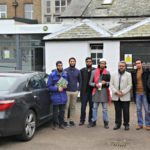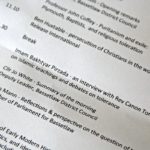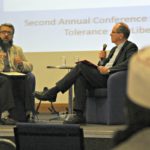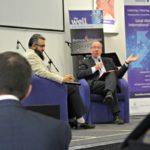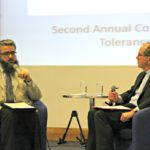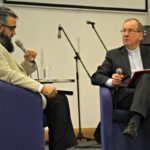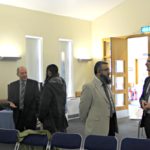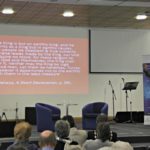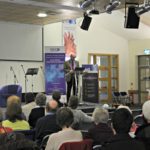On Saturday 11 March 2017, Retford’s second Annual Religious Tolerance Conference was held at The Well Conference Centre.It was attended by Jamia Al-Karam Vice-Principal and WAAG UK Vice-President, as well as a group of senior students of Jamia Al-Karam. Speakers at the conference included Cllr Jim Anderson (Chairman of Bassetlaw District Council), Prof John Coffey (University of Leicester), Ben Huxtable (Release International), Cllr Jo White (Deputy Leader of Bassetlaw District Council), and John Mann MP (Member of Parliament for Bassetlaw). The Vice-President shared the stage with Rev Canon Tony Walker (Rector of Retford Team Ministry) for an intriguing conversation on Islamic teachings and debates on tolerance.
News from Retford Times: http://www.lincolnshirelive.co.uk/major-national-religious-tolerance-gathering-held-in-retford/story-30202620-detail/story.html
The following Press Release was issued by the Bassetlaw Christian Heritage hosting the conference:
Bassetlaw Christian Heritage: “Religious freedom everywhere must be defended”
Religious freedom and tolerance have been promoted in and around Bassetlaw for over 400 years. Following the successful event to commemorate the 400th anniversary of the death of Thomas Helwys in 2016, the second Annual Religious Tolerance Conference took place at The Well Baptist Church and Conference Centre in Retford on Saturday, March 11th 2017. This event attracted attendees from in and around Bassetlaw, North Nottinghamshire.
The conference was opened by Cllr Jim Anderson, Chairman of Bassetlaw District Council, with an inciteful world overview linking faith to humanity, democracy to freedom, and tolerance to understanding. Cllr Anderson focused on the point that religious freedom everywhere must be defended, using examples from scripture to support the argument.
The main speaker, John Coffey, is Professor of Early Modern History at the University of Leicester. He brought to life the stories of Thomas Helwys, who lived at Broxtowe Hall, and John Murton, from Gainsborough, both of whom advocated religious tolerance, not only within Christianity, but between religions and also for those without. They also promoted a separation between civil and spiritual loyalty, saying that the King could not dictate a person’s religion. This was revolutionary at the time, 400 years ago, and it cost Helwys his life. It is a concept that is still a topical issue today.
Another advocate of religious freedom with links through marriage to Bassetlaw was Roger Williams who married Mary Bernard, the daughter of Rev Richard Bernard, Vicar of the Priory Church in Worksop. Roger and Mary travelled to the New World Colonies following the journey of the Mayflower Pilgrims, and eventually set up Rhode Island State. Williams got on well with the native population in the area, and welcomed all beliefs, including pagans, into the Rhode Island State.
Professor Coffey focused the debate on the question of who had responsibility for an individual’s soul, and the role of coercion in religious practice. In the third century, Tertullian had written to a proconsul of Cartharge stating the case for the religious freedom of the individual. However, since St Augustus in the fifth century justified the use of force against an heretic sect, the principle of the church having responsibility for the safeguarding of individual souls had grown, especially following the conversion of Constantine, the Roman Emperor who joined the Eastern and Western empires, and converted to Christianity.
Ben Huxtable, from Release International gave an overview of the world situation regarding persecution, where 80% of all acts of religious discrimination are against Christians. Release uses the phrase “Love Kills Hate” and advocates that we use our freedom wisely through “Love in Action” on the basis that you can always make a difference.
Rev Canon Tony Walker, Rector of Retford Team Ministry, interviewed Imam Bakhtyar Pirzada, Vice-Principal of Jamia Al-Karam based at Eaton Hall near Retford, which provided a fascinating insight into the Muslim faith. Imam Pirzada explained that Islam attempted to create a state of peace in three main elements: the Mind, the Body and the Soul/Heart, and that it was essentially opposed to violence. There are six key concepts of dignity, diversity, no compulsion in religion, commonality, neighbourliness, and the preference of peace over war. Imam Pirzada highlighted the ‘golden age’ of Islam in Europe before the Renaissance, especially in Muslim Spain, when all major religions lived together in harmony and contributed to the scientific and intellectual development of Europe. Citing poverty, ignorance and politics as the causes for most civil unrest, he stated that less than 1% of the Muslim population were potential extremists, whilst the majority are interested in getting on with their lives. He said that Islam is about intellectual intelligence and learning, referring to Al-Azhar University in Cairo as a source of Islamic learning for over a thousand years.
Sharia Law was discussed as governing the ‘body’ or the physical element of faith, dealing with every aspect of living including worship and social dealings. It includes a penal code, but is not fully enforced anywhere in the world with the teaching of Islam categorically instructing people to adhere to the law of the land. Aspects of Sharia Law are adopted by Muslims and non-Muslims alike such as its principles of Islamic finance and Sharia-compliant banking, which the major banks in the UK and elsewhere have provisions for. About education, Imam Pirzada said it was important to have “both eyes open” referring to the religion and the place where you live, the context. He felt extremists promoted fallacies and misinterpretations of out-of-context passages from classical times, without contextualising the religion and that is what created the problems. The founder of Jamia Al-Karam is a respected scholar among the British Muslim community and one of the top 500 most influential Muslims in the world, and he was the first to write against extremism, and state the illegitimacy of the group ISIS according to Islam (ISIS: State of Ignorance).
Councillor Jo White, Deputy Leader of Bassetlaw District Council, and Cabinet Member for Regeneration, had the extremely challenging task of summarising the morning’s discussions, which she did, accurately highlighting the themes of tolerance running through each presentation.
The conference was closed by Bassetlaw MP, John Mann, who had returned from co-chairing a conference on tolerance in Germany with Chancellor Merkel. He highlighted, with personal examples, the fact that prejudice still existed in Bassetlaw and needs to be resisted. He referred to 2020 being an historic date and opportunity for the area in and around Retford to again assert its place in history, and the shared values between the US and UK, in advocating tolerance, political justice and freedom. He concluded by saying that we should look forward, with a firm understanding of our past, into a future to 2020 and beyond, to promote our values of democracy and tolerance.


